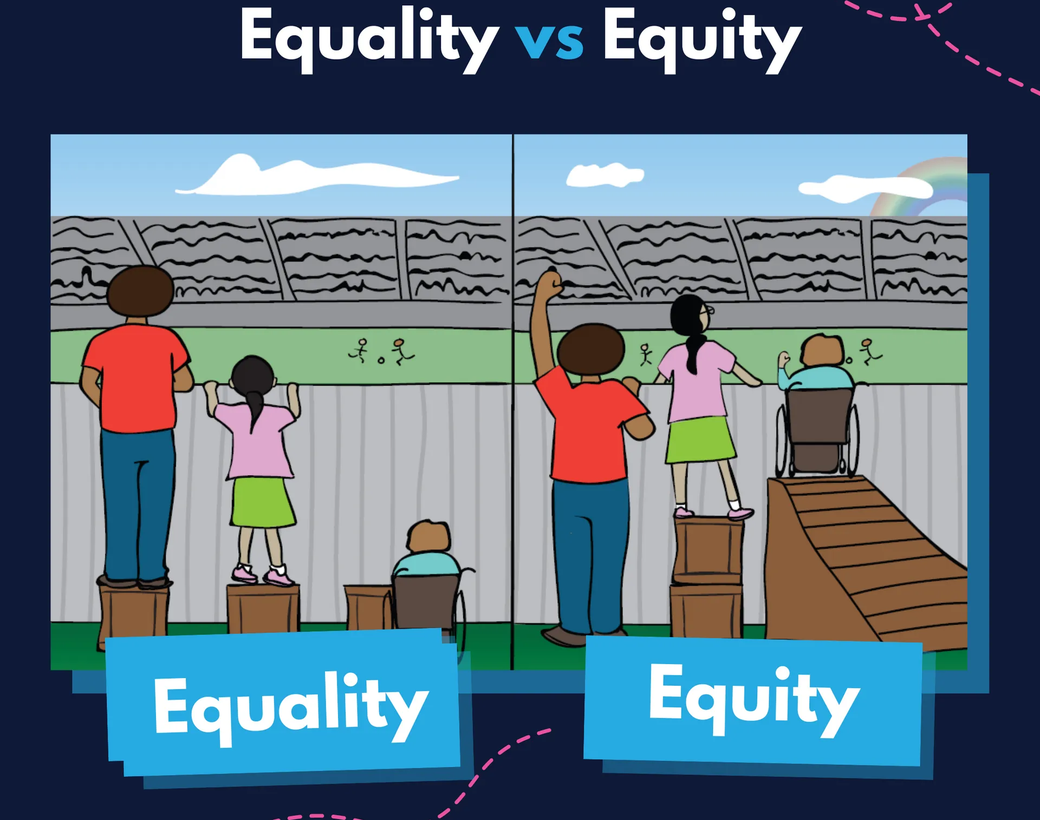Equity vs. equality in the workplace: Why they’re important in 2023

With the candidate-short market stubbornly taking hold, diversity, equity, inclusion, and belonging (DEIB) will be even more important in 2023. We explore the difference between equality and equity, and why creating workplace equity should be the main goal for every organisation this year.
Defining equality and equity in the workplace
In a nutshell, equality is when you give everyone in your workplace the same resources or opportunities. Let’s say, you gift everyone the same size and model bicycle so they can ‘go green’ and improve their physical wellbeing. This can feel like the fairest approach.
On the other hand, equity is giving everyone what they need to be successful. As you can see from the diagram, that may mean a few custom-built bikes in order to meet each person’s specific circumstances.

Source: Equity Tool
Given we are all individual creatures with different needs, the one-size-fits-all approach, while it might be equal, is not equitable or fair if a portion of your employees don’t benefit (often those from marginal or underrepresented groups who are already starting from behind).
As International Women’s Day explains it, the goal of equity is to change the systemic and structural barriers that get in the way of one’s ability to thrive.
How equity leads to inclusion
The word ‘inclusion’ in DEIB refers to the systems and initiatives you put in place to make sure that everyone is included, heard, and considered. Equitable hiring practices are key to building an inclusive workplace.
For example, how often do we see photos of a boardroom full of executives that are all older, pale males (coincidentally, twinning in matching navy suit and tie). While sceptics would be quick to say, ‘They’ve been hired based on merit!’ Statistically speaking, that’s hard to swallow.
Melinda King, Head of Diversity, Equity, and Inclusion at 23andMe, says evaluating job requirements is crucial to fostering equity in hiring processes. As Melinda points out, ‘How can you truly have a diverse recruiting process when you are asking for qualifications and experiences that most individuals from communities that have been marginalised would not have had access to because of systemic problems?’
Employers are notorious for asking for five years’ experience for even the most junior of roles, and university qualifications for disciplines that can be taught on the job. Which brings into question the fairness of requiring qualifications from specific (elite) institutions and 20+ years of leadership experience when you take a beat to consider, who’s actually going to qualify for that applicant pool? And is this all truly necessary?
How equity leads to belonging
As AHRI notes, being diverse, equitable, and inclusive is not enough to create a work environment that helps people get the best out of themselves if they don’t also feel like they belong there. Imagine spending 40 hours every week in a workplace where there’s a sense you don’t ‘fit in’, a sense that you must change or hide who you are to prosper or advance (referred to as code-switching).
Feeling like we belong requires a psychologically safe environment where we’re empowered to speak up, challenge, and make mistakes. Real inclusion.
Workplace equity leads to belonging because it acknowledges the inequalities that exist and aims to address the imbalances and dismantle the barriers holding people back. What could be more empowering than that?
Fostering workplace equity
When we embrace equity, we embrace diversity and inclusion. We create safe and productive workplaces where everyone, everywhere can play a part and be their best selves along the way. It is absolutely the right thing to do, and it’s also the smart business thing to do.
Want to learn more about how to be a better ally and champion for workplace equity?
Reach out to us for a list of our preferred DEIB consultants to make your goals a priority in 2023.